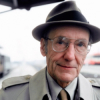William S. Burroughs

William S. Burroughs
William Seward Burroughs IIwas an American novelist, short story writer, satirist, essayist, painter, and spoken word performer. Burroughs was a primary figure of the Beat Generation and a major postmodernist author who wrote in the paranoid fiction genre, and his influence is considered to have affected a range of popular culture as well as literature. Burroughs wrote eighteen novels and novellas, six collections of short stories and four collections of essays. Five books have been published of his interviews and...
NationalityAmerican
ProfessionWriter
Date of Birth5 February 1914
CountryUnited States of America
Out of the closets and into the museums, libraries, architectural monuments, concert halls, bookstores, recording studios and film studios of the world. Everything belongs to the inspired and dedicated thief…. Words, colors, light, sounds, stone, wood, bronze belong to the living artist. They belong to anyone who can use them. Loot the Louvre! A bas l’originalité, the sterile and assertive ego that imprisons us as it creates. Vive le vol-pure, shameless, total. We are not responsible. Steal anything in sight.
I wasn't exposed to art as I was growing up, and can't recall the first time I saw a work of art. However, I remember very clearly a vision I had of a little green reindeer when I was a child, and visions emanate from the same mythical area where painting resides. Whatever the reason, I immediately felt comfortable working with visual materials.
Speaking for myself, art differs from writing in that I never know what I'm going to paint until I paint it, so it's almost like automatic writing. A writer, on the other hand, can't help but know what he's going to write, because the activity demands a degree of premeditation.
It is to be remembered that the origin of all the arts-music, painting and writing-is magical and evocative; and that magic is always used to obtain some definite result.
All writing is in fact cut-ups. A collage of words read heard overheard. What else?
I see no reason why the artistic world can't absolutely merge with Madison Avenue. Pop art is a move in that direction. Why can't we have advertisements with beautiful words and beautiful images?
We can translate word and letter into color - [Arthur] Rimbaud stated that in his color vowels, words quote "words" can be read in silent color.
Visual art and writing don't exist on an aesthetic hierarchy that positions one above the other, because each is capable of things the other can't do at all. Sometimes one picture is equal to 30 pages of discourse, just as there are things images are completely incapable of communicating.
Nothing exists until or unless it is observed. An artist is making something exist by observing it. And his hope for other people is that they will also make it exist by observing it. I call it 'creative observation.' Creative viewing.
Artists to my mind are the real architects of change
The first and most important thing an individual can do is to become an individual again, decontrol himself, train himself as to what is going on and win back as much independent ground for himself as possible
One very important aspect of art is that it makes people aware of what they know and don’t know they know. . . . Once the breakthrough is made, there is a permanent expansion of awareness. But there is always a reaction of rage, of outrage, at the first breakthrough. . . . So the artist, then, expands awareness. And once the breakthrough is made, this becomes part of the general awareness.
It is to be remembered that all art is magical in origin - music, sculpture, writing, painting - and by magical I mean intended to produce very definite results. Paintings were originally formulae to make what is painted happen. Art is not an end in itself, any more than Einstein's matter-into-energy formulae is an end in itself. Like all formulae, art was originally FUNCTIONAL, intended to make things happen, the way an atom bomb happens from Einstein's formulae.
Artists to my mind are the real architects of change, and not the political legislators who implement change after the fact.